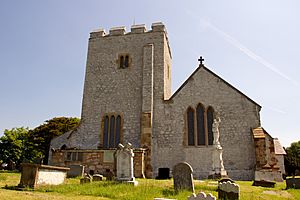William Freney facts for kids
William Freney was an English Dominican friar, a type of monk. He became an archbishop (a high-ranking church leader) for a place called Edessa around 1263. William spent his life working in both England and the Middle East. He was a skilled diplomat, meaning he helped kings and Popes talk and make agreements.
William's Work in the East
In 1254, William was in Rome. He was trying to help King Henry III change his promise to go on a crusade. A crusade was a religious war.
On August 1, 1263, Pope Urban IV gave William an important job. The Pope told a church leader named Opizo di Fieschi to make William an archbishop. William was to serve in a region like Arabia, Media, or Armenia. William was already a bishop and was planning to travel to the East. Opizo made him the archbishop of Edessa. Edessa (now called Urfa) was a city that had been under Muslim rule since 1144. William was the only archbishop there in the 1200s. His job might have been to help spread Christianity in these lands.
William was very good at speaking different languages. This made him a valuable diplomat. In 1264, Pope Urban sent William to King Hethum I of Armenia. William's mission was a success. He helped improve relations between Armenia and the Pope. King Hethum even wanted to build a Dominican monastery in his kingdom.
We don't know where William was between 1267 and 1273. He might have joined Prince Edward on his crusade to Syria in 1271–72.
William's Time in England
William spent the years 1265–1267 in England. This was during the Second Barons' War, a time of fighting. On February 12, 1265, King Henry III gave William a church position in Wimborne. This was to support him until he returned to his own area or got another job. Later, the King gave William money and then a manor (a large estate) called Havering. In 1266, William was given another manor, Silverstone. But by May 1267, William had lost these manors. People had complained about the fees he was collecting from the tenants.
During the siege of Kenilworth in 1266, William tried to help. He tried to talk to the rebels inside the castle for the King's army. But they would not let him in. On July 21, 1266, the King asked him to escort some rebel leaders for peace talks. These talks also failed. However, a writer named William Rishanger described William as "a man of good judgment and praiseworthy speech."
William may have left England when he lost his manors. But he was back by August 1273. At this time, Edward, who was now king, gave William some wine. William seemed to stay mostly in England after that. He worked closely with the church in Norfolk. In 1274, he offered a special church blessing (an indulgence) to people who visited a chapel. This was to pray for past abbots and honor a wooden stretcher. This stretcher had carried the body of Edmund the Martyr to Bury St Edmunds in 1014. On December 28, 1275, William helped dedicate this chapel.
By 1276, William was helping the diocese of Norwich as a suffragan bishop. This means he assisted the main bishop. That year, he helped dedicate a site for a new Carmelite monastery in Norwich. He also dedicated the main altar at Bishop's Lynn. In November 1277, he was acting as a Papal nuncio, a Pope's representative. He wrote to Godfrey Giffard, the bishop of Worcester, about collecting church taxes called Peter's pence. That year, King Edward gave him more wine. In November 1278, he helped the new bishop, William Middleton, dedicate Norwich Cathedral. In 1280, he attended a ceremony to move the remains of Hugh of Lincoln to Norwich.
In 1282, William received another manor called Cringleford. The last time he appears in records is 1286. There is no sign that he went back to the East after 1273. We also don't know when he died. He was probably buried in a Dominican monastery. His tombstone was later moved to St Mary's Church in Rhuddlan during the Dissolution of the Monasteries. This was when many monasteries were closed. His tombstone shows a bishop with his special hat (mitre) and staff (crozier). The writing on it says, "Pray for the soul of Friar William Freney, archbishop of Rages."
Images for kids
 | Ernest Everett Just |
 | Mary Jackson |
 | Emmett Chappelle |
 | Marie Maynard Daly |



